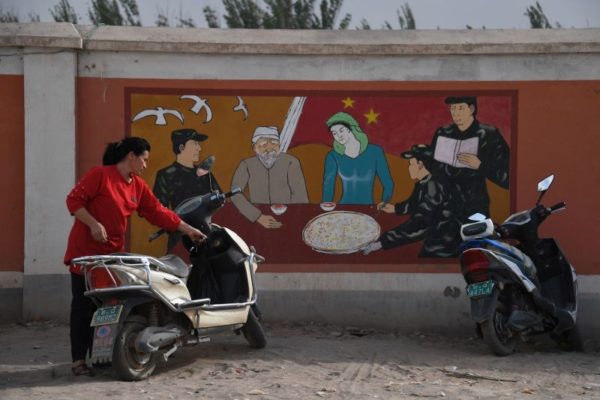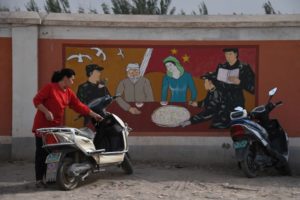The World Bank Was Warned About Funding Repression in Xinjiang
 This photo taken on June 2, 2019 shows a Uighur woman beside a propaganda painting showing soldiers meeting with a Uighur family, outside a military hospital near Kashgar in China’s northwest Xinjiang region. – China has enforced a massive security crackdown in Xinjiang, where more than one million ethnic Uighurs and other mostly Muslim minorities are believed to be held in a network of internment camps that Beijing describes as “vocational education centres” aimed at steering people away from religious extremism. (Photo by Greg Baker / AFP) (Photo credit should read GREG BAKER/AFP/Getty Images)
This photo taken on June 2, 2019 shows a Uighur woman beside a propaganda painting showing soldiers meeting with a Uighur family, outside a military hospital near Kashgar in China’s northwest Xinjiang region. – China has enforced a massive security crackdown in Xinjiang, where more than one million ethnic Uighurs and other mostly Muslim minorities are believed to be held in a network of internment camps that Beijing describes as “vocational education centres” aimed at steering people away from religious extremism. (Photo by Greg Baker / AFP) (Photo credit should read GREG BAKER/AFP/Getty Images)
Foreign Policy, 27 August 2019

By Bethany Allen – Ebrahimian-
A World Bank loan program to a supposed educational project in Xinjiang, China, that has now come under congressional scrutiny previously faced internal concerns, Foreign Policy has learned. Documents also show that at least $30,000 was used by the schools not for educational purposes but to purchase high-end security gear, including barbed wire, tear gas, and body armor.
On Aug. 23, the Congressional-Executive Commission on China, a U.S. government agency that tracks human rights issues in China, issued a letter to World Bank President David Malpass expressing concern about the bank’s $50 million loan program for the “Xinjiang Technical and Vocational Education and Training Project” given to the Department of Education in China’s northwestern region of Xinjiang. That region is home to about 10 million Uighurs, a mostly Muslim ethnic minority, over a million of whom are now forcibly interned in camps that the Chinese government claims are intended to teach vocational skills.
But the U.S. government commission wasn’t the first to sound the alarm about the World Bank’s support for the Xinjiang Technical and Vocational Education and Training Project. In July, a World Bank employee wrote a lengthy email to an executive director on the bank’s board detailing concerns about the Xinjiang program. In a copy of the email reviewed by Foreign Policy, the employee, who requested anonymity as they were not authorized to speak to the press, listed numerous issues perceived as red flags and suggested that the program should be referred to an internal inspection committee for investigation to ensure that World Bank rules were being followed. These concerns went unheeded.
The World Bank says that the program has been thoroughly vetted to ensure the funding is not used to abet human rights violations.
But red flags abound. Yarkand Technical School, which is managed by another school as part of the World Bank program, spent about $30,000 purchasing 30 tear gas launchers, 100 anti-riot batons, 400 sets of camouflage clothing, 100 sets of “stab-resistant clothing,” 60 pairs of “stab-resistant gloves,” 45 helmets, 12 metal detectors, 10 police batons, and barbed wire, according to a tender dated November 2018. The tender was first unearthed by the independent researcher Shawn Zhang. It’s not clear if this money came directly from the World Bank loan, or from other funding sources, but it points to worrying cross-over between the camps and legitimate schools.
Over the past two years, the Chinese government has detained between 1 million and 2 million Uighurs in a massive network of secret camps in Xinjiang, where inmates are subjected to intense propaganda on behalf of the party-state and forced to renounce Islam. The camps’ existence was first reported in Western media outlets through the use of satellite imagery, amid rumors of mass disappearances and emptied-out villages in the far-western region. Though China initially denied the reports, officials later said the camps were part of a program to teach Uighurs “vocational skills in education and training centers.”
A 2018 investigation by AFP revealed that local governments in Xinjiang had purchased truckloads of police batons, pepper spray, cattle prods, and handcuffs for the so-called training centers—one of several such investigations that helped prove to the outside world that the vocational training centers were actually internment camps.
The World Bank approved the loan in May 2015, according to a press release on the organization’s website. The program was projected to benefit 48,500 young people in Xinjiang, where it would “build high-quality teaching and management teams and upgrade school facilities and equipment” as well as offer “short-term training programs to rural farmers and urban migrant workers and provide technical services to local communities and enterprises,” according to the press release. The bank has run similar programs in several other Chinese provinces and in other countries around the world.
The language that the Chinese government uses to describe the detention camps is very similar, and in some cases identical, to the name of the World Bank loan program. On Aug. 16, China’s State Council released a white paper titled “Vocational Education and Training in Xinjiang” defending the government’s actions there and saying that the centers are necessary “to prevent the breeding and spread of terrorism and religious extremism.
The language that the Chinese government uses to describe the detention camps is very similar, and in some cases identical, to the name of the World Bank loan program.
“We understand the World Bank loan began before the advent of widespread mass internment camps,” Congressional-Executive Commission on China chair Sen. Marco Rubio (R) and co-chair Rep. Jim McGovern (D) said in the letter. “Nevertheless, our concern is that the World Bank continued to disburse the loan, including for capital building projects, even after it was clear that mass internment was occurring and that the Chinese government was spreading propaganda in defense of its policies.” The letter asked Malpass to answer a set of questions about the funding, oversight, and future of the program.
But many of these worries had already been flagged by the World Bank employee in the July memo. First, the employee said that some of the World Bank’s communications with the Xinjiang government seemed to contain euphemisms for the policy of mass detention. The employee flagged two quotes in particular from these communications: “Provincial activities are still proceeding slowly due to staff turnover again which resulted from provincial-wide policy of massive supporting to southern rural areas” and “lasting challenges of staff shortage and teachers’ heavy workload all schools faced due to the provincial wide policy of supporting southern region.” The employee indicated that this “support” to the “southern rural areas,” the part of Xinjiang hardest-hit by the mass detentions, is a euphemism used in Chinese propaganda to refer to the repressive policies there.
Second, the employee said that the number of participants in the short-term training programs seemed unusually high, noting that it had already reached double the expected target. The employee wrote that this could possibly be indicative of some element of compulsion. The employee told Foreign Policy in a separate message that the “usual experience at the bank is that projects struggle to achieve what they set to achieve,” which is why the high number of participants was eye-catching.
Third, the employee wrote that all of the on-location supervision in the past year had been performed only by Chinese nationals.
Fourth, the bank rated the program’s environmental and social risk as “Moderate,” on a scale of High, Significant, Moderate, and Low. Yet, the employee wrote, this belied the extreme and systematic human rights violations occurring the region, as well as that these violations related specifically to what the government was calling “vocational and educational training.”
The political and governance risk was also rated as Moderate, according to documents posted to the World Bank website.
“If Xinjiang is Moderate then I don’t know what’s Significant or High,” the employee told Foreign Policy in a separate message.
The employee did not consider these red flags as prima facie evidence of wrongdoing but rather as indicative of the need for further investigation to make sure the World Bank was not abetting human rights violations.
According to the employee, the email resulted in the executive director requesting a briefing on the program, but there was no further follow-up.
“I think we screwed it up as an institution,” the employee told Foreign Policy.The World Bank has previously suspended loans when human rights conditions in recipient countries deteriorated. In 2014, the bank delayed a $90 million loan for health programs in Uganda after the government there passed a law making “aggravated homosexuality” punishable by life in prison. World Bank officials argued that although the anti-gay law was not directly related to the health programs, the risk of indirectly causing harm was too great.
There are other concerns with the program. The Uighur language itself has come under attack as part of what critics call a program of cultural genocide. Uighurs speak a Turkic language and learn Mandarin as a second language in school, though many Uighurs, particularly those who live in rural areas, speak Mandarin poorly or not at all. Xinjiang authorities have banned Uighur language education in some parts of the region. Inside the detention camps, inmates attend Chinese language classes—videos show Uighur adults smiling as they repeat rote phrases in Chinese. Children with two parents in detention camps have been sent to orphanages where children are not permitted to speak Uighur. Meanwhile, while Chinese was once useful to Uighur seeking work elsewhere, the vast majority of Uighur are now confined to Xinjiang.
Yet one criterion for measuring the success of the World Bank’s loan program in Xinjiang was participant pass rates on a Chinese language exam, according to a July results report. Program staff found that the top issue among minority students at these universities was language ability—or, to quote the project’s Ethnic Minority Development Plan from December 2014, “The phenomenon of ‘Dumb Chinese’ is widely exist among minority students.”
The project has five partner schools: Xinjiang Engineering College, Xinjiang Agricultural Vocational and Technical College, Xinjiang Vocational and Technical College of Light Industry, the College of Xinjiang Uyghur Medicine, and Urumqi Vocational University. According to World Bank documents, the loan program is used to construct new facilities, improve teaching and curricula, and “strengthen linkage between school and industry” at these campuses, as well as to support nonpartner schools and members of the community. Forty-four percent of the student population of these schools are ethnic minorities.
“Those institutions are legitimate schools,” the employee told Foreign Policy in a message. “But that doesn’t mean the project is legitimate.”
The World Bank Was Warned About Funding Repression in Xinjiang

